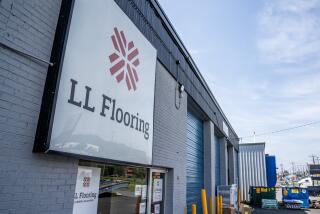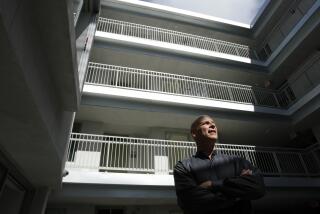Hill Williams Asks Chapter 7 Liquidation : Bankruptcy: Anaheim Hills developer that solicited partnership investments to build homes files in federal court.
- Share via
SANTA ANA — Hill Williams Development Corp., the Anaheim Hills home builder that for three years solicited investments in partnerships to build moderately priced houses, has filed for liquidation under Chapter 7 of the federal bankruptcy code.
“We have taken possession of all the records of the income funds, and we’re trying to get a handle on what the operation of the funds was all about,” said Ronald Rus, attorney for the court-appointed trustee for the estate.
The investors, many of them elderly, were promised monthly returns that amounted to 15% annually on a minimum investment of $5,000. Until recently, the partnerships received their generous dividend checks on the first of every month without a hitch.
In January, however, the company’s president, Donald H. Williams, announced that the company had “temporarily suspended” the payments because of a cash-flow problem. Two lawsuits--one of them a class-action suit--have since been filed against the company on behalf of investors, who put up a total of $90 million.
The four partnerships, in a filing Friday at U.S. Bankruptcy Court in Santa Ana, listed a total of $89.3 million in assets and $77.5 million in debts.
Hill Williams Development formed the first of the partnerships in 1989. President Williams wooed investors by hosting bus tours of the company’s properties. He told potential investors that they would serve as a “bank,” lending money to the home builder at a time when real estate loans from customary sources had become tough if not impossible to get.
Rus said Hill Williams showed a total of 4,325 investors representing about 6,300 investments. Many of those counted as a single investor are husband-and-wife teams. “The typical investor is at least 55 years old,” he said.
Hill Williams put investor dollars toward about two dozen properties, mainly partially developed lots or raw land in Riverside and San Bernardino counties. “It appears that all of the loans made (with investor funds) are second deeds of trust,” Rus said.
“Recovery of the investments depends on the value of the real estate that stands as security on these loans,” he said, adding that the trustee is in the process of evaluating the properties.
Attorneys representing the investors say little investor money can be recovered.
“There’s very little if any equity in the properties due to the highly leveraged nature of the transactions,” said San Diego attorney Tim Cohelan, who filed the class-action suit against Hill Williams and against brokers who advised clients to invest in the partnerships. “We believe that many of these transactions were a sham.”
Mark Harman, an attorney for the state Department of Corporations, would not comment on the bankruptcy filings. He would say only that the department is still “looking into” conducting an investigation of Hill Williams.
Investors reacted to news of the bankruptcy filing with dismay. “How would you expect me to feel? I feel terrible,” said Morris Elbaum, who lives in the Leisure World Laguna Hills retirement community.
Elbaum, a retired diamond setter, and his wife, Jan, invested $10,000 in one of the partnerships. “It’s a loss of money that we can’t afford to lose,” he said.
Fred C. Schnell sent a check for $25,000 to the fourth partnership on Dec. 28--just two weeks before Hill Williams announced suspension of dividend payments.
“They cashed it on Dec. 30, and I never saw it again,” said Schnell, 52, a real estate agent in Camarillo. “I feel like I’ve been robbed. But I also feel silly because I’m in the profession myself.”
More to Read
Inside the business of entertainment
The Wide Shot brings you news, analysis and insights on everything from streaming wars to production — and what it all means for the future.
You may occasionally receive promotional content from the Los Angeles Times.










